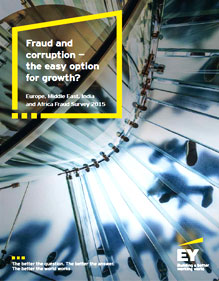|
Getting your Trinity Audio player ready...
|
 Ernst & Young’s (EY) 14th global fraud survey (GFS) for Europe, Middle East, India and Africa, was released on 14 May. The report reveals a trend of unethical behaviour in corporates that is driven by pressure to achieve higher revenue and greater earnings growth.
Ernst & Young’s (EY) 14th global fraud survey (GFS) for Europe, Middle East, India and Africa, was released on 14 May. The report reveals a trend of unethical behaviour in corporates that is driven by pressure to achieve higher revenue and greater earnings growth.
Titled Fraud and corruption – the easy option for growth?, the survey highlights the challenges that push executives over the line of ethical behaviour. These challenges include market volatility for commodities and currencies, geopolitical instability, and economic sanctions, among others.
Ultimately, fraud and corruption risks impact corporate international expansion, says EY.
The survey found that:
- 61% of respondents in key rapid-growth markets say corruption is widespread.
- 20% of businesses believe that their anti-bribery or anti-corruption policies make them less competitive.
- 37% of respondents agree that companies often overstate their financial performance.
- 33% of respondents say that management is under greater pressure to expand into higher risk markets.
Information was gathered between December 2014 and January 2015, through interviews conducted electronically or in person. The respondents comprised some 3 800 employees working in large businesses in 38 countries, including South Africa.
Large businesses, according to the survey definition, have more than 150, 250, 500, 1 000 or 1 500 employees globally, depending on the country, or are quoted on a stock exchange, or are multinationals.
Gratification in SA
In South Africa, the survey found:
- 78% of respondents believe that bribery or other corrupt practices happen widely in the country.
- 10% believe that offering gifts to win business is justifiable to help a business survive.
- 15% say that cash payments to win business are justifiable to help a business survive.
- 45% say that companies often report financial performance better than it is.
In addition, 22% of South Africans – slightly more than the global average of 21% – say they have heard of:
- Revenues being recorded before they should to meet short-term financial targets.
- Customers being required to buy unnecessary stock to meet short-term financial targets.
- Underreporting of costs incurred to meet short-term financial targets.
According to the survey, 77% of South African respondents regard slower economic growth than expected as a challenge, highlighting that managers, like their global counterparts, are under pressure to create new revenue opportunities and to expand into higher risk markets.
Businesses must take the initiative in protecting themselves
The types of unethical behaviour depends on the market, says EY’s global forensics leader David Stulb, but besides outright bribery, they range from cooking the books to kickbacks, reallocation of assets, and cybercrime – which is not about state-sponsored espionage, but rather hacking activities, organised crime, and individuals who breach systems.
In terms of the titular question, the survey shows that far from short cuts being the answer, there is a clear pattern in companies that are growing and are taking compliance seriously. Furthermore, EY says, respondents whose business has experienced revenue growth in the last two years are:
- More likely to rate their company’s ethical standards as “very good”.
- More likely to have or know about their company’s anti-bribery or anti-corruption policy.
- More likely to see operations across markets meeting the same ethical standards.
Also, the results show that businesses that have experienced revenue growth in the last two years are more likely to be seen as ethical by their employees, not only at head office but also across operations in different countries. These businesses, EY notes, are more likely to have effective compliance policies and procedures in place, and management is more engaged in monitoring compliance and risk mitigation.
Good behaviour must start at the top
The buy-in of top management to anti-corruption attitudes and practices remains the most critical factor in changing an organisation’s culture. Fingers often point at middle management, but those at senior level have more to do than they believe they are doing, according to EY.
“Our results show that they overestimate their impact in terms of how effectively they are communicating the importance of high ethical standards. An effective and sustainable integrity and compliance program requires significant and sustained commitment from the top,” the survey notes.
And such anti-corruption attitudes and policies should not impede growth. “To grow in a high-risk market you need the right controls and processes,” says Stulb. “You need your teams to be trained to make the right choice when asked to pay a bribe or ‘cook the books’, and you need the right tools to monitor activity so these risks can be addressed in a timely manner.”
However, these tools have not been globally implemented. The survey shows that:
- 42% of respondents say that their company does not have an anti-bribery or anti-corruption policy, or are unaware of them.
- 37% of respondents have not had anti-bribery or anti-corruption training.
- 24% say their company does not have a whistleblowing hotline.
In South Africa the picture is different. Here, 85% of respondents do have an anti-bribery or anti-corruption policy and code of conduct in place, while 27% have not had anti-bribery or anti-corruption training, and only 13% say their company does not have a whistleblowing hotline.
This also shows in the 72% of South Africa respondents who feel that the tone from the top in terms of anti-corruption or anti-bribery policies is good, compared with the global 50% of respondents who say their senior management have strongly communicated their commitment to those policies.









